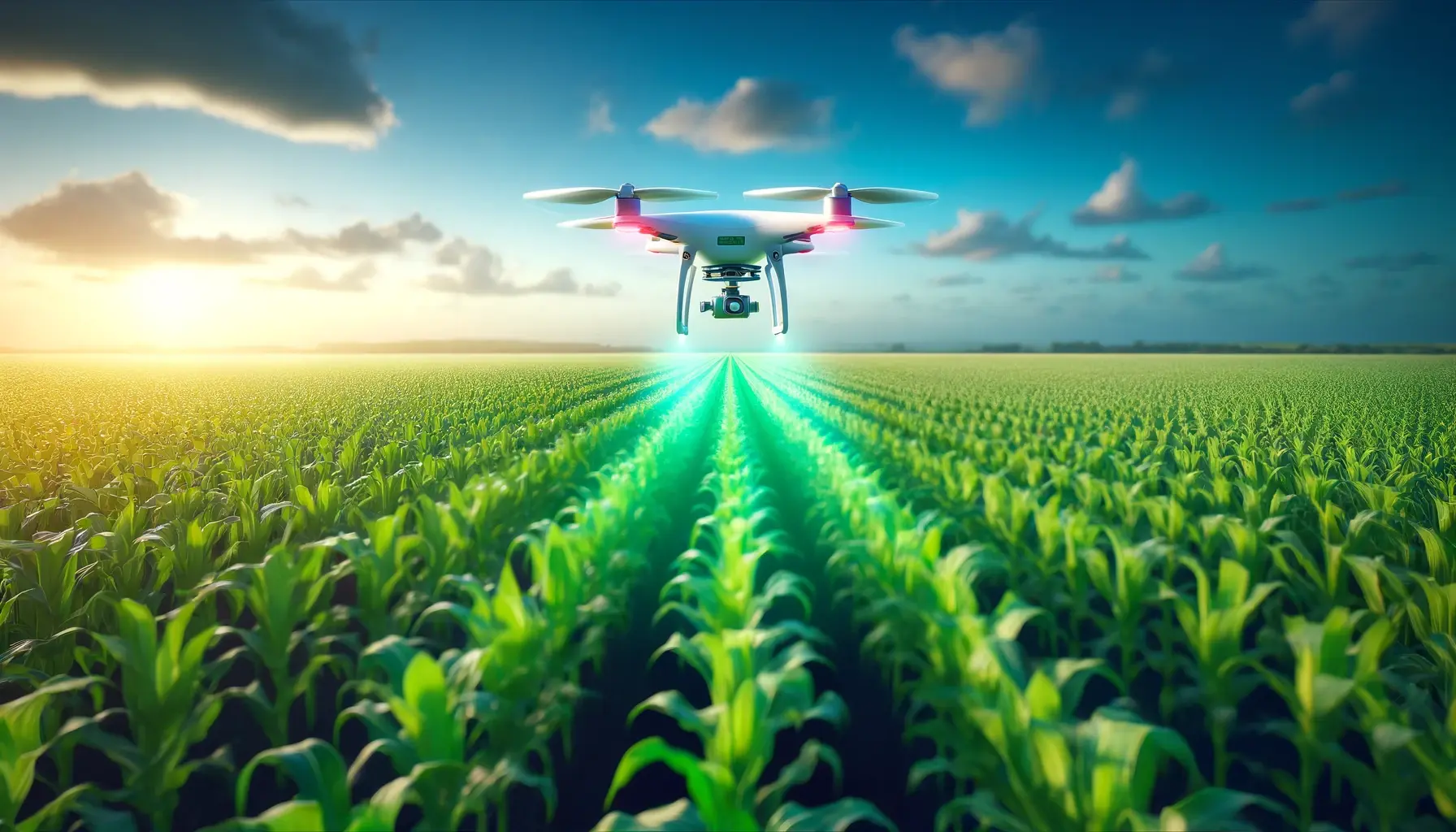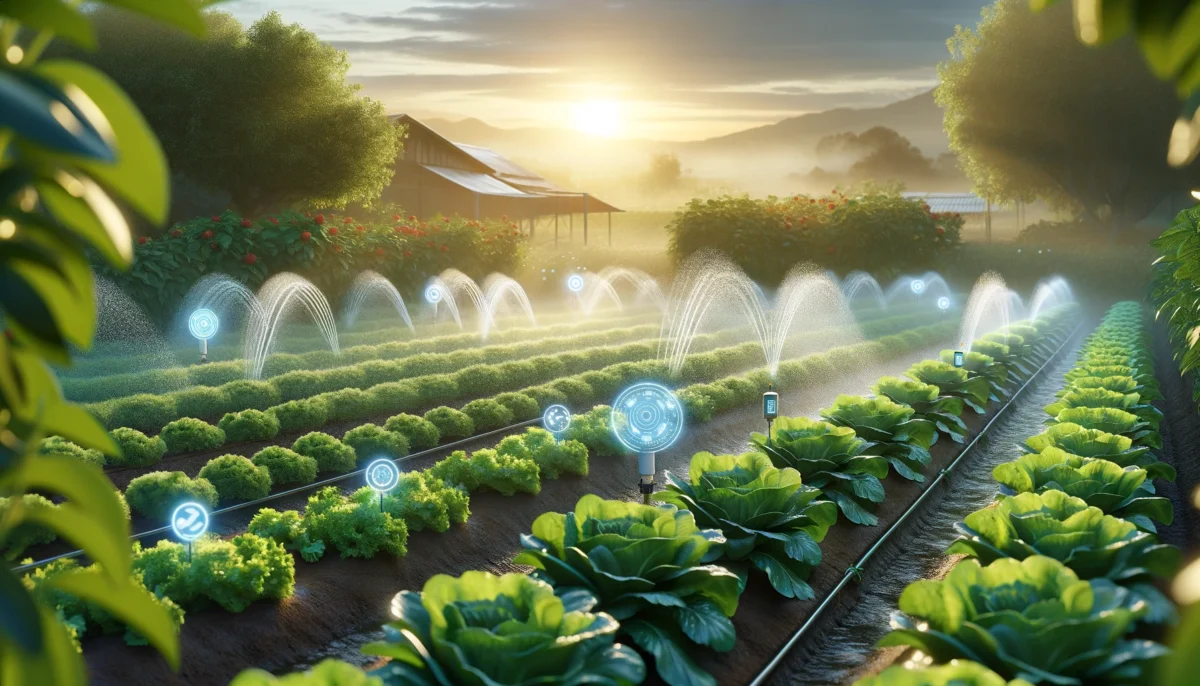AI In Agriculture: The Future Of Advanced Farming Is Here

Introduction
Generative AI in agriculture began by improving how we grow crops and manage resources. It uses machine learning and lots of data to analyze soil and detect plant diseases. By 2032, this market could be worth about $1.3 billion.
Early efforts set the stage for today's AI-enhanced farming. As technology got better, we started collecting massive data from sensors, satellites, and drones. This data is crucial for AI to be effective in agriculture. Moreover, farmers have always aimed to produce more food using fewer resources. AI arrived just in time to help with this challenge.
Now, AI assists farmers in making informed decisions about planting times, pest management, and optimal irrigation methods. These tools have made farming more efficient and increased productivity. However, increasing AI use in farming introduces new challenges. We must keep the data safe from theft. Also, as farms become more automated, some workers may need to learn new skills for new job types.
Main Use Cases
AI in agriculture offers many great benefits. One key example is precision farming. How it goes, AI analyzes data from satellites and field sensors assisting farmers in improving crop health and boosting yields. Moreover, Generative AI solutions give farmers real-time insights into soil conditions leading to smarter choices about watering and feeding crops.
Next, automated weed control is another important use. AI robots move through fields, quickly spotting and pulling out weeds. This cuts down on the need for harmful herbicides, saving money and helping the environment. These robots are very precise, protecting nearby plants and promoting healthier crops.
Lastly, AI is also useful for managing pests. It uses weather and crop data to forecast pest attacks. Farmers can act early, avoiding the need for too much pesticide. This early action keeps crops healthy and lessens environmental harm.
Top 5 Benefits of AI in Agriculture
Environmental Conservation
AI technologies play a crucial role in promoting sustainability. They reduce waste and optimize resource usage, minimizing the environmental impact of farming activities. This shift makes farming practices more eco-friendly. As a result, these intelligent tools contribute to cleaner, more efficient farms, ensuring a healthier planet for future generations. By using AI, farmers can better manage their operations, leading to more sustainable agricultural practices that benefit both the environment and the community.
Disease and Pest Control
AI-driven systems detect early signs of pests and diseases in crops, allowing farmers to take swift action. This quick response prevents the spread of these issues, protecting more crops from harm. By catching problems early, farmers can maintain the health and productivity of their fields. With fewer pests and diseases to worry about, farmers can focus on growing strong, healthy crops. This not only boosts yields but also ensures a more sustainable farming practice. AI helps farmers keep a closer eye on their crops, making it easier to spot issues before they become serious problems. This way, farmers can enjoy a more bountiful and reliable harvest season after season.
Weather Forecasting Accuracy
AI improves the accuracy of weather predictions. This helps farmers prepare for bad weather, protecting their crops and optimizing harvest times. By providing timely and precise forecasts, AI allows farmers to make informed decisions about planting, watering, and harvesting. This not only boosts productivity but also reduces losses due to unexpected weather changes.
Imagine a farmer knowing exactly when a storm will hit or when to expect a dry spell. With this information, they can take preventive measures, such as covering crops or adjusting irrigation schedules. AI-driven weather predictions become an essential tool for farmers, offering peace of mind and contributing to a more efficient farming process.
Labor and Cost Efficiency
AI is transforming agriculture by taking over many labor-intensive tasks. This technology doesn't just save on labor costs; it also boosts efficiency. Farmers can now manage more with fewer resources, focusing on what truly matters—growing healthy crops and sustaining their livelihoods.
Imagine the relief of having a machine handle the backbreaking work of planting, watering, and even harvesting. With AI, farmers can spend more time monitoring crop health and making informed decisions to improve yield. Plus, this technology helps reduce waste and ensure that every resource, from water to fertilizer, is used wisely.
Supply Chain Optimization
AI makes supply chain management of agricultural products smoother and more efficient. From the farm to the store, conversational AI solutions monitor and improve the journey of goods. This means fresher produce and less waste. Farmers can use AI to predict crop yields, track weather patterns, and optimize harvest times. Transport companies can plan better routes, avoiding delays and keeping products at their best. Retailers benefit from having fresh stock that meets customer demand, leading to happier shoppers and reduced losses. By making each step of the supply chain smarter, AI helps ensure that the food we eat is as fresh as possible.

Disadvantages of AI in Agriculture
High Costs
AI technology often costs a lot. This high price makes it tough for small-scale farmers to buy. They have to cover the costs of equipment, software, and regular upkeep. Additionally, farmers must invest not just money but also time to learn how to use these new tools effectively. Importantly, the benefits of using AI can outweigh these initial challenges, especially as farmers see improvements in their crop production and resource management over time.
Steep Learning Curve
Farmers need to learn how to use complex AI systems and understand the data they provide. This requires time and additional training. As a result, they often have to attend workshops and courses. These educational sessions help them become more comfortable and efficient with the new technology. Step by step, they grow more skilled in making the most of AI to improve their farms.
Reliance on Internet
AI depends on steady data flow and strong internet connections. Many rural areas don't have good internet. So, AI might stop working or lose data. This can be a big problem for farmers using these technologies. They need reliable tools that work well all the time. If the internet is weak, these tools may not perform as expected, leading to issues in their farming operations.
Over-Reliance on Technology
Using AI a lot can mean we use less traditional farming know-how. It's vital to balance new tech with old methods. This helps keep farming skills alive. Plus, using both ensures we don't forget how things were done before. This approach keeps our agricultural heritage strong while we improve with new tools.
Future of AI in Agriculture
The future of AI in agriculture is bright, thanks to continuous technological progress. Innovations like drone technology for crop monitoring and AI-driven genetic editing of seeds promise to boost crop yields and create tougher crop varieties. Furthermore, as AI tools grow more accessible and easier to use, more farmers are likely to adopt them. Additionally, this increase in adoption could improve farming efficiency and sustainability on a global scale. In fact, with each advancement, small and large farms alike find these technologies increasingly indispensable for staying competitive and meeting growing food demands efficiently.
SoftBlues Agency - Advanced AI Developer for Agritech Businesses
SoftBlues Agency leads in advanced AI solutions for farming. We use top technologies to help farmers improve their work, grow more crops, and reduce harm to the environment. Also, our tools assist farmers in predicting market trends and managing risks. This allows for better decision-making. We work hard to ensure small farmers can also use these technologies. Moving forward, SoftBlues Agency keeps creating new ways to support farming in the digital age. Our goal is to help meet global food needs responsibly and efficiently.
Are you ready to develop an efficient and cutting-edge agriculture software? Just click the button below and talk to our Lumia AI assistant. Let’s cooperate for something innovative!

